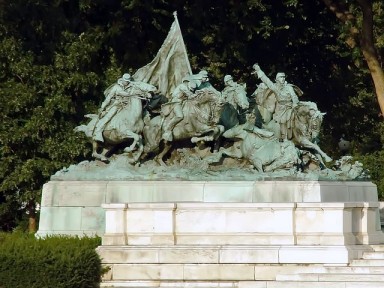
In The Melancholy Hussar of the German Legion, Thomas Hardy explores the themes of selfishness, conflict, commitment, freedom, social circumstances, independence, and love. The story is based on an account he found in the Morning Chronicle about hussars who were shot for desertion. An anonymous narrator tells the story in the first person. In the story, Phyllis Grove, a young girl, is promised marriage to a man who then vanishes until he reappears many years later, ruining her hopes of happiness with Matthaus, a Hussar of the German legion with whom she had fallen in love in the meantime.
The Melancholy Hussar of the German Legion | Summary
The Melancholy Hussar of the German Legion by Thomas Hardy tells the tragic love story of Phyllis Grove and Matthäus Tina. Phyllis lives in complete seclusion with her father, a bad-tempered failed doctor, in a small ‘half farm half manor-house,’ and is engaged to Humphrey Gould, a thirty-year-old bachelor with no distinguishing qualities. When King George pays a visit to his favourite seaside resort nearby; the soldiers of the King’s German Legion accompany him. Matthäus Tina, a twenty-two-year-old corporal, is one of the hussars. Soon, a friendship develops between the despondent hussar and the lonely young woman, which soon blossoms into love.
Matthäus considers desertion because he is sick of the army and misses his homeland, and Phyllis considers herself free to accompany her lover abroad because she believes her prospective husband is lying about their engagement. Her father is against her meeting with the hussar and sends her to her aunt’s house to protect her engagement. Phyllis compares her father’s sister’s home to a prison. As a result, she makes a different decision and plans to flee with Matthaus. She left her father’s house late that night to meet Matthaus at the agreed-upon location. While she waits, she sees Mr Gould, who tells his companion that he wants to make amends with his fiancée by giving her a gift because he feels he has treated her badly. Mr Gould’s unexpected return, however, shakes her resolve and she decides against fleeing with Matthäus, believing herself still obligated to remain faithful to her fiancé.
Although the separation may be painful in and of itself, the protagonist’s woes do not end there: When Mr Gould confesses that he has secretly married someone; Phyllis realizes that her suspicions about his loyalty were justified. But she is unable to follow Matthäus for fear of his safety. The small party of deserters is captured due to a navigational error. Matthäus and his friend Christoph are condemned and shot. Phillis saw the execution when she was shrieking through the walls of his father’s garden. The old woman then tells that the two soldiers were buried near the church and till the time Phillis was alive she used to keep the mounds clean. After her death, she was buried near the soldiers.
The Melancholy Hussar of the German Legion | Analysis
‘The Melancholy Hussar of the German Legion’ is much more than a love story, despite the central theme of Phyllis and Matthäus’ tragic love story. Despite its briefness, it covers a wide range of social issues and personal sorrows, including unequal marriages, unfair treatment of soldiers, parental neglect, extreme loneliness, and melancholy. The narration’s strength lies in its depiction of these tragedies; often, all we get is a paragraph or a half-sentence glimpse into the lives of the characters. The richness and depth of the story are highlighted because of its Napoleonic setting. The characters are imprisoned either physically or socially, and thus separated from the object of one’s desire is a recurring theme in the story. Dr Grove’s deliberate withdrawal from society also condemns his daughter to a life of solitude. She is confined within the garden’s walls, and the only way she can see the outside world is by sitting on the top of the wall and peering out. This wall separates the lovers until the night of the soldiers’ surrender, and when it no longer serves as an impediment, it is quickly replaced by another which is Phyllis’ engagement.
Dr Grove had been a professional man whose taste for lonely meditation over metaphysical questions had diminished his practice till it no longer paid him to keep it going; after which he had relinquished it and hired at a nominal rent the small, dilapidated, half farm half manor−house of this obscure inland nook, to make a sufficiency of an income which is a town would have been inadequate for their maintenance.
Matthäus is prevented from returning to the Saarland by his duty and position as a hussar, and with discharge by purchase impossible due to the war, his only option is to flee. Throughout the story, Humphrey only thinks about himself. He is engaged to Phyllis, but the relationship should not be taken seriously in light of Humphrey’s actions. Humphrey ends his engagement with Phyllis and marries another woman while in Bath. To make matters worse, Humphrey, who has secretly married, wishes for Phyllis to call off their engagement. Humphrey is only concerned with himself and his honour. Without considering how Phyllis might feel. Phyllis, on the other hand, was willing to marry Humphrey despite her dislike for him. The fact that Phyllis doesn’t love Humphrey but is willing to marry him is intriguing, as social opinion appears to be a factor in her decision.
Marriage is regarded as a significant event.
In those days unequal marriages were regarded rather as a violation of the laws of nature than as a mere infringement of convention, the more modern view, and hence when Phyllis, of the watering−place bourgeoisie, was chosen by such a gentlemanly fellow, it was as if she were going to be taken to heaven, though perhaps the uninformed would have seen no great difference in the respective positions of the pair, the said Gould being as poor as a crow.
Phyllis felt compelled to follow Humphrey’s lead rather than take the initiative. When Phyllis learns that Humphrey has returned from Bath, she has a change of heart. She no longer feels capable of leaving England with Matthäus. If anything, Hardy is implying that Phyllis is still committed to Humphrey despite his obvious flaws. She’s engaged with him and is following the societal norms of the time. Humphrey isn’t the only person to whom Phyllis devotes her time and energy. The reader learns from the narrator that Phyllis took care of Matthäus and Christoph’s graves until her death. It’s as if she understands exactly how much both men paid for their freedom. Due to her commitment to Humphrey, she was unable to embrace her freedom.
Their graves were dug at the back of the little church, near the wall. There is no memorial to mark the spot, but Phyllis pointed it out to me. While she lived she used to keep their mounds neat, but now they are overgrown with nettles and sunk nearly flat. The older villagers, however, who know of the episode from their parents, still recollect the place where the soldiers lie. Phyllis lies near.
The Melancholy Hussar of the German Legion | Themes
In this short story, Hardy has explored the themes of selfishness, conflict, commitment, freedom, social circumstances, independence, and love. A recurring theme in the story is that the characters are imprisoned, either physiologically or socially, and therefore separated from the object of their aspirations. Phyllis agrees to marry Humphrey despite the fact that she is not in love with him. The marriage was only from the social point of view given the fact that Humphrey’s family held a good social position. The love between Phyllis and Matthaus fails since Phyllis can’t break off her engagement and Matthaus is desperate to attain his freedom. Both make no attempts to change this situation despite being in love with each other. The theme of selfishness is exemplified through Humphrey’s actions who throughout the story only think about himself and doesn’t pay heed to anyone.
The Melancholy Hussar of the German Legion | Character Sketch
Phyllis – Phyllis is the protagonist of the short story. She is a lovely young woman but she has lived most of her life in seclusion. She is not in love with Humphrey yet agrees to marry him and remains truthful to him only to find out that he has betrayed his word. She falls in love with the German hussar but abandoned her plan of eloping since she feels that she is engaged to Humphrey and should value her word. Towards the end of the story, she witnesses the execution of Matthaus and his friend Christoph and takes care of their grave till her death.
Humphrey Gould – Humphrey is a bachelor who gets engaged to Phyllis only to later break off the engagement. He is neither young nor old, neither good-looking nor plain. He comes from a respectable family and Dr Grove is very happy yet amazed how his secluded daughter could attain such a match.
Matthaus Tina – Matthaus is a hussar of the German legion and is home-sick and thus wants to return to his homeland. He has left his mother alone and longs to be with her. Given the situation, his only option to go back is by fleeing. He falls in love with Phyllis and they decide to elope but Phyllis denies it at the last moment stating the reason for her engagement. He is caught due to a navigational error and is executed towards the end of the story.
Dr Grove – Dr Grove is the father of Phyllis. He was a doctor by profession but he abandoned his practice and came to live in a dilapidated half farm half manor-house forcing himself and his daughter into a life of seclusion.
The Melancholy Hussar of the German Legion | About the Author
Thomas Hardy was a poet and novelist from England. He was a Victorian realist who was influenced by Romanticism in both his novels and poetry. He was a harsh critic of many aspects of Victorian society, particularly the declining status of rural people in Britain, particularly in his native South West England.
Despite the fact that Hardy wrote poetry throughout his life and considered himself to be primarily a poet, his first collection did not appear until 1898. At first, he was known for novels such as Far from the Madding Crowd (1874), The Mayor of Casterbridge (1886), Tess of the d’Urbervilles (1891), and Jude the Obscure (1895). Many of his novels are about tragic characters that are torn between their impulses and their social circumstances, and they are frequently set in the semi-fictional Wessex region.





